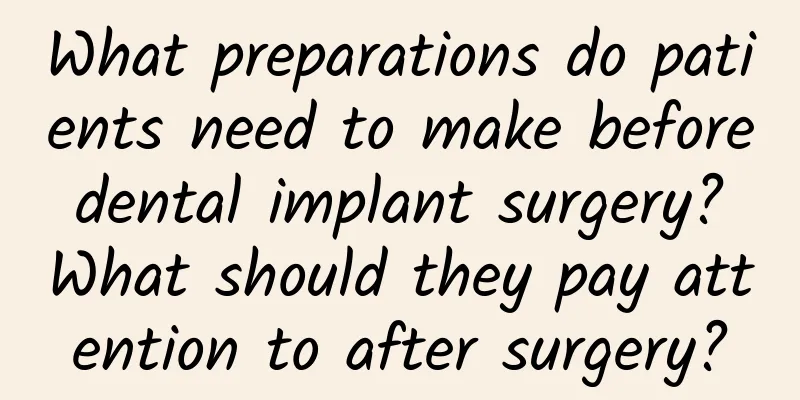What preparations do patients need to make before dental implant surgery? What should they pay attention to after surgery?

|
Author: Luo Wei, deputy chief nurse, Peking University People's Hospital Reviewer: Sun Zheng, Chief Physician, Beijing Stomatological Hospital, Capital Medical University With the development of medical technology, dental implants have gradually come into the public eye, solving the problem of missing teeth and improving our quality of life. Figure 1 Original copyright image, no permission to reprint Before dental implant surgery, patients need to do the following preparations: First, a CBCT examination, four infection tests (including AIDS, hepatitis B, hepatitis C, and syphilis), and blood sugar and blood pressure measurements are required before the operation. Second, if the patient has oral inflammation or other oral diseases in the surgical area, it is best to go to the hospital for relevant examinations and treatments, and then perform implant surgery after the inflammation is controlled. Third, if the nurse finds that the patient is anxious and nervous through communication with the patient before the operation, she should provide the patient with some psychological counseling in advance to obtain the patient's cooperation during the operation. Fourth, if the patient has decided to have surgery, the patient should be advised not to drink alcohol the night before the surgery to avoid affecting the anesthesia effect the next day. The patient should also be advised to get a good sleep and not stay up late. The patient should not be on an empty stomach when visiting the doctor the next day to avoid hypoglycemia. There are also some routine medications, such as antihypertensive drugs and hypoglycemic drugs, which should be taken on time without stopping. In addition, for women, it is best to avoid surgery during the menstrual period. Oral implant restoration is an invasive restoration method, which is different from the traditional restoration mode. In addition to the conventional surgical symptoms such as bleeding and pain, there are also certain risks, such as implant failure, implant loosening, and falling off, so implant patients will have a certain degree of anxiety and tension. If the patient becomes nervous and anxious, certain changes will occur in the body, such as increased heart rate, increased blood pressure, faster breathing, etc. Therefore, it is necessary to help the patient overcome this psychological problem and explain some necessary nursing knowledge to him. For example, before the operation, the patient should be introduced to the process of implant surgery and the problems that may arise in very popular and simple language, so that the patient can understand the basic knowledge, relax psychologically, and make psychological preparations before the operation. After the oral implant surgery, patients are advised to eat warm and soft food for the first 1 to 3 days, such as soft noodles, porridge, steamed buns, rice, etc. Do not eat hard or hot food. It is recommended that patients brush their teeth on the day after surgery instead of brushing the implant area, and it is best to take a shower the next day. It is best to quit drinking and smoking in the near future, because excessive smoking is not conducive to the bone healing of the implant. Within three days after the operation, it is recommended that patients rest more, talk less, and avoid doing some strenuous sports. Figure 2 Original copyright image, no permission to reprint At the same time, patients should observe the implants in their mouths. If any parts become loose or fall off, they should not be nervous but should keep them well and seek medical attention in time. If the implant patient has diabetes, he or she must monitor the changes in his or her blood sugar on time. In terms of post-operative wound care, the patient should first know where the wound is, and then pay attention to observe the wound. If the wound has persistent active bleeding, he should go to the hospital immediately. Secondly, you must learn to protect the wound. In the implant wound area and the bone graft area, you must avoid pressure from hard objects. Furthermore, if a maxillary sinus lift is performed, the patient should be advised to avoid blowing the nose forcefully and avoid coughing or sneezing violently, because such behavior can cause changes in the maxillary sinus pressure, which is not conducive to the operation. Note that after the operation (before the stitches are removed), try not to take a plane to prevent bleeding. |
<<: How to care for the crown after dental implant surgery?
Recommend
What causes women's leg pain?
There are many factors that cause leg soreness in...
People who never dare to show their feet in summer have this unspeakable secret (it’s not athlete’s foot, it’s contagious)
In the hot summer, when others wear light sandals...
Can I run during menstruation?
Many female friends want to pursue a well-proport...
What is watery leucorrhea
Leucorrhea is a physiological phenomenon in women...
10 breast enhancement soups to get C cup breasts is no longer a dream
1. Fungus and Red Dates Soup Ingredients: 10 gram...
Can I eat cherries during the confinement period?
During the confinement period, pregnant women usu...
What to do if you have naturally low progesterone?
Low progesterone can cause great harm to women, e...
Is it normal for the fetus to move under the belly?
After a pregnant woman becomes pregnant, fetal mo...
How to induce lactation in postpartum women? These methods are very effective
Some women do not produce milk after giving birth...
What does a high hcg value mean?
Hcg is a blood value used to indicate whether a w...
Can I practice yoga during my period?
Nowadays, many women are desperately practicing y...
Why do I have menstrual pain after a miscarriage?
Some pregnant women have miscarriage due to physi...
My period hasn't come yet and I'm still irritated
During women's menstrual period, their body&#...
Why are off-road vehicle tires thick and sports car tires thin?
Why are off-road vehicle tires thicker and sports...
Will spotting during early pregnancy mean miscarriage?
Because the older generation lacks certain cultur...









